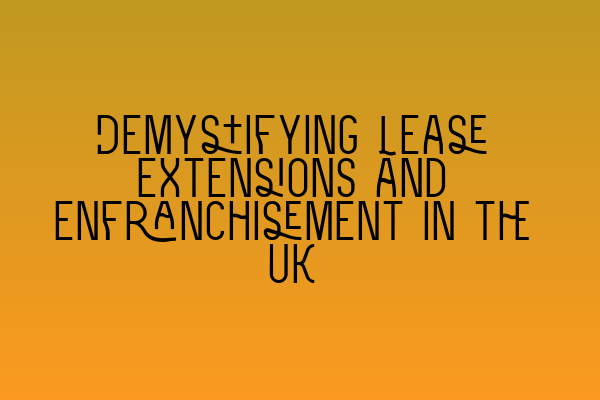Demystifying Lease Extensions and Enfranchisement in the UK
Lease extensions and enfranchisement can be complex and confusing topics for property owners in the UK. However, understanding these concepts is essential for anyone looking to extend the lease on their property or acquire the freehold of a leasehold property. In this article, we will demystify lease extensions and enfranchisement, providing you with clarity and guidance on these important legal processes.
What is a Lease Extension?
A lease extension, as the term suggests, refers to the act of extending the leasehold tenure of a property. In the UK, most residential leaseholds are granted for a fixed term, typically between 99 and 125 years. As the lease term approaches its expiration date, the value of the lease decreases, and the property becomes less attractive to potential buyers. Therefore, extending the lease is crucial for maintaining the value and marketability of the property.
The process of extending a lease involves negotiating with the landlord or the freeholder and agreeing on the terms and conditions of the extension. This includes determining the length of the lease extension, the ground rent, and any other associated costs.
Why Extend a Lease?
Extending a lease offers several benefits to property owners, including:
- Maintaining the value of the property: By extending the lease, you ensure that the property retains its value and remains attractive to potential buyers in the future.
- Increasing marketability: A property with a longer lease is generally easier to sell compared to one with a shorter lease.
- Reducing ground rent: Lease extensions often involve renegotiating the ground rent, which can result in significant savings over time.
- Gaining peace of mind: Extending the lease provides peace of mind, knowing that you have secure tenure of the property for an extended period.
It’s important to note that extending a lease becomes more expensive as the lease term shortens. Therefore, it’s advisable to consider extending the lease sooner rather than later to minimize costs.
What is Enfranchisement?
Enfranchisement refers to the process of acquiring the freehold of a leasehold property. Leasehold properties are typically subject to various restrictions and obligations imposed by the freeholder or landlord. Enfranchisement provides leaseholders with the opportunity to gain full ownership and control over their property, freeing them from these restrictions.
Enfranchisement can be carried out individually by a leaseholder or collectively by a group of leaseholders within the same building or development.
Why Enfranchise?
Enfranchising a leasehold property offers several advantages:
- Full ownership: Enfranchisement allows leaseholders to become the outright owners of their property, giving them greater control and decision-making power.
- Freedom from restrictions: Once enfranchised, leaseholders are no longer subjected to the restrictions imposed by the freeholder, such as obtaining permission for alterations or paying ground rent.
- Potential increase in property value: Freehold properties generally have higher market values compared to leasehold properties. By enfranchising, you may experience an increase in the value of your property.
The Legal Process
The legal process for lease extensions and enfranchisement involves several steps, including:
- Assessing eligibility: Before initiating the process, it’s crucial to determine whether you qualify for a lease extension or enfranchisement. Requirements may vary depending on the type of property and the specific circumstances. Consulting with a property law expert is recommended to ensure eligibility.
- Serving a formal notice: If eligible, the next step is serving a formal notice to the landlord or freeholder, expressing your intention to extend the lease or enfranchise the property.
- Negotiating terms: Once the notice is served, negotiations begin to agree on the terms and conditions of the lease extension or enfranchisement.
- Obtaining a valuation: As part of the process, an independent valuation of the property may be required to determine the premium payable for the lease extension or enfranchisement.
- Drafting the legal documentation: Once the terms are agreed upon and the valuation is completed, legal documentation, such as the lease extension agreement or enfranchisement contract, is drafted.
- Completion: The final step involves executing the legal documentation, paying the agreed premium, and registering the lease extension or enfranchisement with the Land Registry.
It’s important to seek professional advice and legal representation throughout the process to ensure your rights and interests are protected.
The Role of Solicitors
Engaging the services of a knowledgeable and experienced property solicitor is crucial when dealing with lease extensions and enfranchisement. A solicitor will guide you through the legal process, ensuring that all necessary steps are taken correctly and efficiently.
SQE Property Law & Land Law, a reputable property law firm, specializes in lease extensions, leasehold enfranchisement, and related legal matters. Their expert team of solicitors will provide you with the necessary support and advice throughout the process, ensuring a successful outcome.
In conclusion, lease extensions and enfranchisement can seem overwhelming, but with the right guidance and support, they can be navigated smoothly. Understanding the benefits and legal processes involved is essential for property owners in the UK. So, if you are considering extending your lease or enfranchising your leasehold property, don’t hesitate to seek professional advice.
For additional resources on the SQE exams and preparation, check out the following articles:
